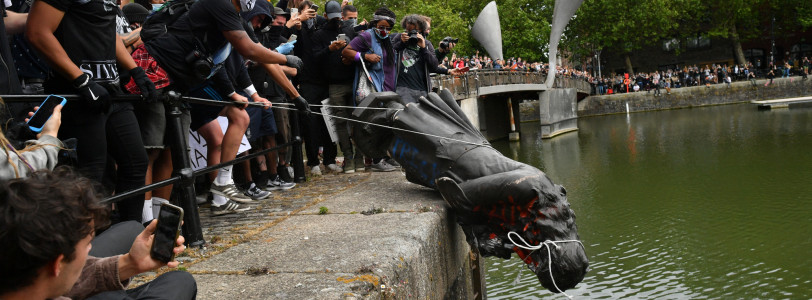Racism, what is it?
I was contemplating whether to include some dictionary definition of what exactly constitutes ‘racism’, but the fact is that racism for me and other ethnic minority groups cannot be reduced to words on a page – it’s something we know implicitly, and have to endure every single day.
The UK is often touted as a multicultural, accepting and progressive society and it is on some issues. Yet, The Office For National Statistics (ONS) reports the majority of people are White British (84.8%), begging the question of what does racism mean for the remaining minority?
Racism to me is far more than words on a page, it’s something I have had to contend with my whole life; ‘routine’ police checks, side-eye on aeroplanes and racists telling me to ‘go back to where I came from’, as a British-Asian.
This is of course not something unique to me and if you ask any ethnic minority individual in the UK, virtually all of them will have similar stories to tell about their experience with racism – covert or overt. Unfortunately, it is not a distant problem and the country is not as progressive as it may like to think it is.
I’m 23, male and I am very proud to say that me and my family are all British-Asian (Indian). My mother and father were born abroad but emigrated to this country with virtually nothing to their name, and through sheer blood, sweat, and tears they have been able to create a better life for their children. Something I’ve always been thankful for is they have not let me forget who I am and where I come from; language, culture and religion is something that they have instilled in me from the day that I was born, walking the difficult tightrope of assimilating into another country whilst staying connected to one’s roots.
There have been times however where I have personally nearly lost my footing walking this tightrope. Being ‘British-Asian’ is a delicate balance and there have been times whereby I have certainly felt more one than the other in an attempt to try and fit-in whilst maintaining a relationship with my ethnic heritage. This is a struggle I am sure that virtually every person from an ethnic minority background can relate to; whether you’re getting rusty in your native tongue or eliciting looks over what you’ve brought for lunch, sometimes it can be difficult to appease both your grandparents and your white friends in primary school.
Unfortunately, this sometimes leads to people conforming and sacrificing one identity for the other. Punjab (where my family is from) has an incredibly rich and vibrant culture and a big part of this is music. Indeed, at home there is music played constantly from the moment we wake up to when we fall asleep – my time at home is soundtracked by the musical stylings of incredible artists such as Satinder Sartaj. Yet, when I was growing up I would enjoy this music privately but I would never do the same publicly. When I was asked to put music on by my friends I would put on hip-hop, grime or rhythm and blues, because I felt these were the genres of music that would help me fit in best with people I was around. Nowadays, I have developed the confidence to accept and enjoy all these aforementioned music genres – Satinder Sartaj might even get played if I’m with people who I know would enjoy or would appreciate it. This societal pressure to fit in though is something that we all face – black, brown or indeed even white. This pressure can be even worse however if you are from an ethnic minority group because it is two-fold; one faces pressures both at home and in public. What is important is reconciling both these identities. An ethnic minority individual should be able to celebrate both their ethnic heritage and the fact they are British, free from the cognitive dissonance that is often created when one feels compelled to try to ‘fit in’.
One of the most frustrating aspects when it comes to discussing racism in the country is its repudiation. Any attempt to have a productive conversation around very real problems surrounding race in the UK, are met with denial, deflection and derailing the conversation entirely to the point of it breaking down. The only explanation that I can think of for this is perhaps the visibility of racism within the country – Britain is more so covertly racist than overtly racist and much of it is committed behind closed doors. Indeed, at times it certainly feels like it is not taken seriously unless it manifests as an overt racial slur.
Perhaps overt racism is the best place to start then, as this is the presumed manifestation of racism. Apologists will often appear to deny the existence of racism because they do not witness overt racism, which is a blissfully ignorant approach which subscribes to the aphorism of ‘out of sight, out of mind’. Sure, on the surface level there may not be many incidents of overt racism that occur in the public eye. What’s disconcerting though is how little it takes to get below the surface and elicit racist responses. Racists feel comfortable to retort with racial slurs or telling you to book the first flight back home. Personally, I’ve been the target of racial slurs for some of the most incredulous situations imaginable; road-rage incidents where the other party is wrong or even online for expressing my personal opinions – anger, anonymity or alcohol are all that is needed before true colours begin to show from certain people. The hilarity of being told back to where I come from though is that I am from and am a citizen of the UK. My family, friends and work are all predominantly in this country and this is where I have laid my roots. Going back to where my ethnic heritage lies would entail me emigrating to an entirely different country, India is a place that I’ve certainly spent time in but I would have to start afresh if I was to emigrate there. So, where exactly am I meant to ‘go back’ to?
As I said, racism typically manifests behind closed doors and in an insidious and covert form in Britain. We might not hear the n-word and the p-word on a day to day basis anymore, but racism is more entrenched in systems, institutions and subconscious biases than it has ever before. This isn’t even a dirty little secret anymore, with entire record-breaking television series like Line Of Duty, being produced that address the issue and yet there is still no collective action being taken against it. Unfortunately, even as I am writing this there has been another news story that reinforces my point – racism has been cited as a key factor in the police's strip search of a fifteen year old black schoolgirl. Child Q’s ordeal is disgusting and should never have been allowed to have happened. We as a society owe it to her and other ethnic minority children to ensure that it never happens again. The deserved public outcry surrounding this incident must be harnessed and used for collective action, as it is collective – not solitary – action that will allow us to expunge racism.
These more covert racist incidents are much harder to identify as they are by nature, well… covert. However, as an ethnic minority there are certain suspicions that you have but that you often dismiss. Why did I not get that job? Why did the police stop me? Why do airport security frisk me for even longer? One should not have to endure these things and subsequently have to ask themselves these questions.
One of the greatest myths about our country is that racism is not a problem and we are progressive. Now don’t get me wrong, I love the life that this country has afforded to me, my family, and my friends, but that certainly does not mean that it is perfect or that there is no room for improvement. We as a collective society need to facilitate conversations about racism that transcend simple lip service, and galvanise when we are afforded the small pockets of opportunity that allow us to create real change.
‘Great’ Britain can be made even better.









0 Comments